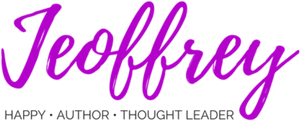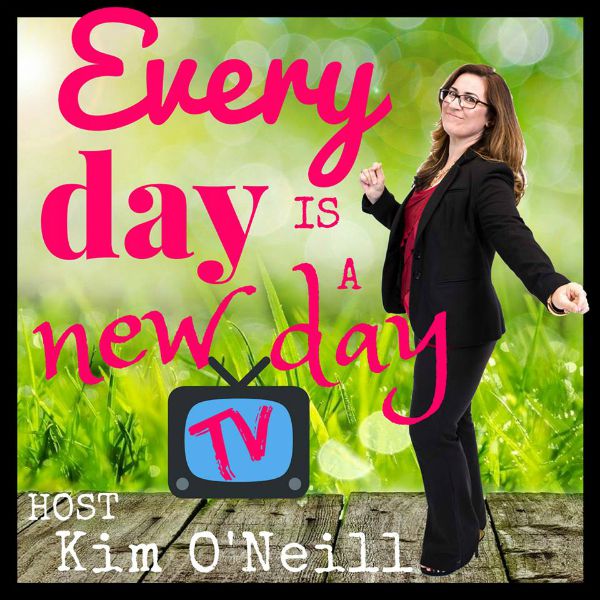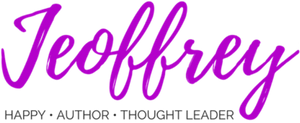Kim O’Niell: Wow.
Jeoffrey H: I know right.
Kim O’Niell: Thank you for sharing that. That was so incredibly powerful. I think on the one hand, even just for me to hear. I think just to be expressed in the universe, and I have no doubt it’s going to speak to whoever happens to see this video. Thank you for sharing that. I won’t go into mind but I got chills when you started sharing the story about … Just all of that. When you started sharing that.
My dad also passed away at a younger age, and it was a pivotal moment as well, and same for my siblings.
Jeoffrey H: Mm-hmm (affirmative).
Kim O’Niell: Thank you for sharing that. Very powerful stuff. You could use the word download.
For anyone who is maybe new to hearing that term in a different way, it doesn’t necessarily just mean downloading something from your computer or onto your cellphone. Download information, ideas, inspiration because it’s all connected. All connected from source, higher self. I just want to share that alternative perspective for anyone who might be thinking, “What does he mean, download?”
Jeoffrey H: Yeah, because when I’m talking about download. That’s just one way of giving you a frame of reference, because if you want to look at your body and your mind as a … This is a working computer, and so you can download information. Another way to say it is, “That you are tuning into.” You’re tuning into inspiration because when I say, “I’m happy, and then …” I get into my happy place no matter what it takes. I think the thoughts that I want to think that make me happy, that get me into a place of being comfortable, and loving myself no matter what. And then from that place, I ask my questions of, “Oh, what does my soul most want to experience next?”
Oh. Then I’m receptive to those answers. It’s like really getting into that, you are a wonderful human being and we have a crazy method of operation but we make up the whole method. To download, to tune into, to check in with yourself, to just take a breath and go, “Hmm.” And relax, and then step forward. That’s what I’m talking about. So download, receiving, it’s such a wonderful game that we play.
Like I was telling you in our last interview, that one of the things that we human beings do is that we make stuff up, and then we believe it. If that’s the case. If that’s the most simplistic powerful piece that you can apply to your whole life, you can go, “Well, look at how hard I made my life by believe the things, and saying things that I was saying. Okay, well since I was so powerful and so correct in making my life hell, well why don’t I just go to the other side and make my life wonderful, because nobody had to justify and approve of it other than me on my negative side. Same thing goes for the other side then. I can totally choose, and create the life that I want because I said so.”
It’s that inspiration that then tells us, that we can have this conversation over the internet. That we can be artists. That we can paint. That we can dance. That we can do whatever it is that’s the expression of life that wants to come out of us because again, it’s again, it’s tuning into that receptivity. To that inner inspiration.
Kim O’Niell: What do you say to someone who says, “I’m not just making it up. I’m not just thinking thoughts that aren’t true. I saw it happen. It’s reality.” What do you say to someone who comes back with that answer?
Jeoffrey H: Okay. That’s fine. You’ve had the thought. You kept thinking that thought because again, a belief is just a thought you keep thinking. So yes, it did happen, and it was true and valid for you. You created that experience for yourself, but just because it was true for someone else, just because it was true for you then doesn’t mean that it has to be true for you always. It did happen.
There’s a lot of stuff that happened in my life that I could say that, for as far as all of my positive thinking, I could think back to all of the horrific things that I would imagine that happened in my life, and go, “Oh yeah. Well, what made that stuff happen?”
Well, I can easily justify that because since I was thinking in a victim mentality, I kept creating instances where I was a victim.
Kim O’Niell: Yeah.
Jeoffrey H: Boom. Got you. Yeah. You’re not proving me wrong. You’re actually proving my point and proving how right I am when I say, “You’re the most powerful thing in this universe. It’s your world that you’re creating.” Well yes that bad thing happened to you, but we can also re frame how you look at that negative situation and see how powerful you truly were because … There is a person I was interacting with. It was oil and water. Just totally, totally not mixing, and how I re-framed my interaction with them because they were treating me so poorly, because I was still in my victim mode. I was always finding someone to victimize me, and then someone said to me, “Jeoff, why don’t you just forgive them?”
“I can’t forgive them.” Every time I think about it, it pisses me off. And they went, “Jeoff, I’m not asking you to forgive them for them. I’m asking you to forgive them so you’ll stop causing yourself pain.”
Wait a minute..If I was in this interaction with this person and they were treating me badly, what’s that exact opposite of that emotion that I wanted to pick. Okay, so I was feeling powerlessness. I wanted to be empowered. Oh, they were teaching me to choose to be empowered. Thank you for giving this experience. I got the real lesson.
Kim O’Neill: I think the difference is a lot of people don’t … It’s not conscious creation. They’re just creating by default. Just creating and not realizing that I’m creating every moment in my life. What I attract. What comes next, and that’s the importance of the awareness. Partly why I wanted to do these videos as well, is to speak with people like you who have that awareness and information, and insight to be able to share. You can go from this experience and learn there’s another way, and realize, “Oh, my goodness. Now I see how I attracted that experience into my life.”
How I created what came next. How I created the next thing, and the next thing, and the next thing, and the next thing, next thing. I could have easily said, “I don’t have a TV station so I can’t interview people, and I can’t speak to people.”
Jeoffrey H: Right.
Kim O’Niell: But I said, “No. I’m in charge of my life. What do I want to create for myself? I can do that. How can I make that happen?” I don’t have a studio somewhere. I don’t have a whole camera man, and a sound person. There’s no one over here with a mic and a light.
Jeoffrey H: Right. Right, right.
Kim O’Niell: I’m in my dining room.
Jeoffrey H: Yeah.
Kim O’Niell: I’m in my dining room, and no matter how much I tried to center this photo, it doesn’t get centered.
Jeoffrey H: Yeah. Right. It doesn’t need to be. Let it be off kilter. That’s totally fine.
Kim O’Niell: Yeah. I had to say, “Okay. I’m aware that those things … Sure, this present moment I’m not seeing it, but I still want to do that. How can I do that? I want to have fun with this. How can I do that, and how can I have fun with it? Oh, I can use my computer. Oh. I do kind of like technology, and I like exploring with things. Huh. Let me see what computer programs exist and how can I sort of create a video, and play with it. Who do I know? Wow, low and behold, I know a bazillion people. Who like you, want to share information with other people.”
The awareness allows us to be able to look back and actually see how that past served us. When you reframed the experience and said, “Oh. That …” Having that conversation or whatever the experience was with that person who was oil, your water. Oil and water. How does that actually serve me? Oh. It taught me blah, blah, blah, blah, blah.
Jeoffrey H: Yeah.
Kim O’Niell: To me it all serves a purpose, and all it takes is that flipping the switch in the head, of choosing to see how it can serve you, and how it can help you.



